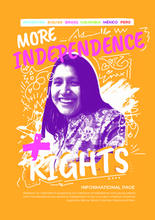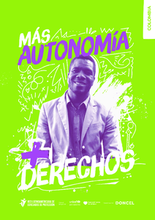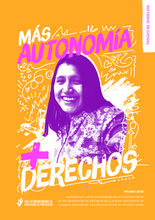childrens_living_arrangement
children_living_without_bio
Displaying 11 - 20 of 51
This document compares three versions of the same home visiting model, aimed at improving parent-child interactions and child development: the well-known Jamaica model, which was gradually scaled up from an efficacy trial (‘proof of concept’) in Jamaica, to a pilot in Colombia, to an at-scale program in Peru.
This webinar heard from three of Family for Every Child's member organisations about their programmes to both integrate and reintegrate children on the move.
The purpose of the research is to generate learning and recommendations to develop public policies to support the transition of adolescents and youth from the alternative care system to autonomous life in Argentina, Bolivia, Brazil, Colombia, Mexico and Peru.
The authors of this study applied a sector‐wide analysis protocol that harmonized components of the Humanitarian Programme Cycle by the Inter‐Agency Standing Committee and of a framework to characterize the governance of early childhood development and education (ECDE) systems.
This webinar builds up on the results of the research More Autonomy, More Rights (2020) Coordinated by CSO Doncel, in the representation of the Latin American Network of Care Leavers and supported by UNICEF LACRO and Hope and Homes for Children.
Este webinario presenta la nota técnica de protección de los niños contra la violencia, el abuso y la negligencia en casa.
"As tensions and challenges from the nationwide quarantine increase, the usual channels that might pick up on abuse are not working," says this article from the Bogotá Post in Colombia.
Este video describe brevemente la investigación de la Red Latinoamericana de Egresados de Protección coordinado por DONCELque estudió cómo se dan los egresos de las y los adolescentes que crecieron bajo el sistema de protección del Estado, lejos de sus familias por haber sufrido abusos, maltratos y violencia.
En este informe se presentan los resultados de la investigación llevada adelante en Colombia que tuvo por objetivo construir información sobre las principales políticas, medidas y acciones que se desarrollan a nivel regional orientadas a acompañar el egreso de adolescentes y jóvenes del sistema de cuidados alternativos e indagar respecto de su eficacia, efectividad, sostenibilidad y adecuación a un enfoque de derechos.
El presente informe reúne los hallazgos principales de una investigación de carácter exploratorio-descriptivo que ha sido desarrollada en seis países de la región (Argentina, Bolivia, Brasil, Colombia, México y Perú). El objetivo fue documentar y analizar las políticas, estrategias y acciones desarrolladas para promover y acompañar la transición de adolescentes desde el sistema de cuidados alternativos hacia la vida autónoma.




